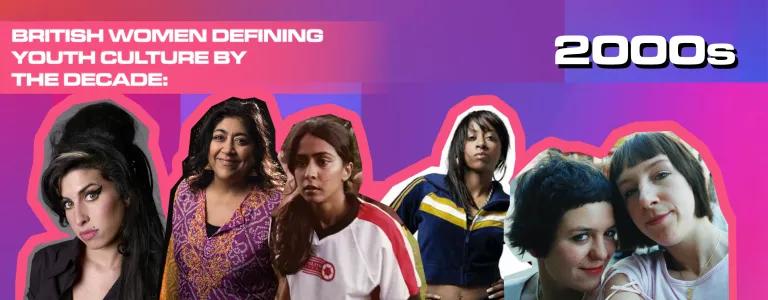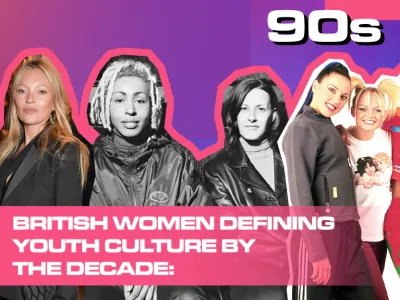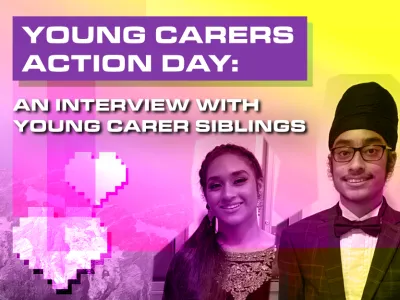
British Women Defining Youth Culture By The Decade: The 2000s
We’re back with the third in our series of British women who helped shape, define, and change youth culture as we know it. Because let’s face it, youth culture is - and always has been - massively influential. From fashion to activism, the music industry to advertising, many people look to the young people of the generation to make decisions that affect, or create, change.
This time, we’re taking a look at the 2000s…
The nineties had been a decade where technology started to flourish and change things, but the 2000’s - or the Noughties - sparked an unprecedented revolution when it came to tech. The rise of the internet, YouTube, and mobile phones that could do a whole lot more than just receive calls, took over people’s lives and gave platforms to a new wave of women who would go on to define the moment (and beyond!).

The rise of the internet saw one platform boom over the others. Myspace became everyone’s best friend in the Noughties, helped everyone learn how to HTML code, and created peer pressure like no else when it came to choosing your Top Eight. Myspace also became a space for different bands and music genres to thrive. Nu Rave became an increasingly popular trend, if only for a few years and was described by The Guardian as “an in-yer-face, DIY disco riposte” with fans “sporting painful fluorescent colours and blowing whistles.” And while the genre of music itself was heavily male dominated, the look - that of fluorescents, neons, whistles, and ALL the big, overstated accessories - was cultivated by women.
And no one did big, overstated accessories better than Tatty Devine. Founded by Rosie Wolfenden and Harriet Vine, Tatty Devine makes handmade (predominantly) acrylic jewellery that is there to make a statement. Rosie and Harriet started the company themselves, and started to bring in a small group of women to help. From the get go they wanted to make jewellery that carried a strong feminist message and started conversations. Since their inception they’ve teamed up with influencers, politicians, charities, cultural institutions and more, like the V&A, Peaches, Scarlett Curtis, Equality Now, Young Women’s Trust, Sarah Millican, Poppy Chancellor, Kae Tempest and Viv Albertine. The jewellery was such a big part of the Noughties and helped young people all over the country express themselves in different ways, speak up on issues that mattered to them, spread political messages, and be themselves. Their designs and vision was so popular that it continues to be a strong brand today - with their most recent collab coming out this month with international charity Equality Now, to raise funds, awareness and champion equal rights for women and girls worldwide!
While Nu Rave only lived a short life, musically, the 2000s saw the start of a genre that would only grow bigger and better: grime. And one artist cemented her position as First Lady of Grime in 2003 with her white label response to Dizzee Rascal’s I Luv U. Shystie was just 22 when she burst onto the scene and quickly became one of the most acclaimed MCs in grime - and was the first to be signed to a major label, Polydor. Her success only grew, and she toured with the likes of Basement Jaxx, 50 Cent, The Streets, and Kendrick Lamar; played a lead role in Channel 4’s Dubplate Drama and starred in Adulthood; performed and modelled at London Fashion Week; and was nominated at the MOBO Awards. Her diverse portfolio of work showed young people that you don’t just have to stick to one thing, and, for young women, showed that you can make an impact - especially in a heavily male dominated industry and world.

Shystie, like most grime artists, found their start on pirate, and underground, radio stations like Rinse FM. Said to be specifically for “young people living and/or working within the central, east and south London areas”, Rinse was founded in 1994 and operated as a pirate station that played grime, garage, dubstep, jungle, and dance music. In the mid 2000’s, they welcomed Sarah Lockhart into the team as Co-Manager. Sarah then spent the next five years campaigning for the station to get a legal FM licence and make sure its groundbreaking work was recognised. As, even though the station was a legitimate business, had a record label, and did club night events, the station - which was the centre of everything - was still technically illegal, which meant that people could easily dismiss it. So, for Sarah, it was imperative to get on the airwaves properly. But it wasn’t all that easy. After five long years, the station finally got a community licence which meant it could be heard far and wide, and start doing more legitimate business, like working with the police to run an anti-violence campaign targeting young listeners. Sarah’s time at Rinse saw her publish artists like So Solid Crew, Wiley, Ms. Dynamite, Skepta, JME, P Money, and Novelist, and it was her determination and single focus that allowed Rinse FM to turn mainstream, and become a powerhouse in the industry, bringing London’s grassroots musical communities together. Now that’s what being a boss looks like!
The Noughties also gave us another powerhouse in the music industry, if only for a brief moment in time. Amy Winehouse shot to popularity in 2003 with her debut album Frank. Full of old school jazz influences, it was Amy’s voice that set her apart from anyone else at the time and elevated her career. Her next album, Back To Black, was released three years later and became the album that really made her, and made people fall in love with her. Her lyrics were raw and personal, her songs emotional, her stories were relatable, and on top of it all, she had a big, bold personality. She was both the girl next door and the party girl who loved to swear, and everything in between, which is exactly why she was so loved and relatable by everyone - no matter who you were you could identify with her in some way. And of course who can forget, she made leopard print, ballet flats, big winged eyeliner, and beehives fashionable again. She dominated music and pop culture, winning Grammy awards, Ivor Novello awards, BRIT awards, British Academy of Songwriters awards, and was nominated for the Mercury Prize. Unfortunately, Amy also struggled with addiction, which led to her death in 2011. Shortly after her death, the Amy Winehouse Foundation was set up to help ‘young people to feel supported and informed, so that they are better able to manage their emotional wellbeing and make informed choices around things that can affect their lives’. The foundation works to prevent the effects of drug and alcohol misuse on young people and inspire vulnerable and disadvantaged young people to help them reach their full potential. Her life and career, while short, made an incredible impact on so many musicians and people around the world, with singers like Adele, Lana Del Rey, Emeli Sande, Florence Welch, Paloma Faith and Billie Eilish all crediting her as an influence and someone who paved the way for them to succeed.

In the world of film, the Noughties gave life to one of the biggest film franchises in the world - Harry Potter. While the books had been around for years already, the first film was released in 2001, and all but two of the whole film series were released in the same decade. It shot Emma Watson into fame and she became an icon for young people across the country and all over the world. As a person she became a huge role model, as she is a proud feminist, a fierce ally to the LGBTQ+ community, understand the importance of sustainability, and a UN Women Goodwill Ambassador. The character of Hermione also found a place in people’s hearts as a smart, strong willed, brave girl. She taught everyone - young girls especially - that loyalty is key, that learning is fun, that friendship comes before anything else, and that it’s okay to be strong and smart.
And there was also Bend It Like Beckham, written and directed by Gurinder Chadha. The film focused on Jesminder - played by Parminder Nagra - a young girl who just wanted to be the greatest footballer in the world - like her idol, David Beckham. The film was a comedy, but also looked at some big issues, like feminism, prejudice and racism, faith, religion and culture, gender roles, and stereotypical views of femininity. Jesminder comes from a conservative Indian family, and her parents forbid her from playing football, believing that it goes against traditional gender-based roles in their culture. Throw in her sister Pinky - the most stereotypical girly girl you’ve ever seen - and this just makes Jesminder’s personality and beliefs even harder to deal with for her parents. Bend It Like Beckham was a cultural phenomenon for many reasons. Blogger, Sara Hussain, says the reason it was so popular then - and remains popular now, twenty years after its release, is because it’s “a female-driven film with a football-playing woman of colour, written and directed by a woman of colour. Bend It Like Beckham was a trailblazer in inclusivity and diversity, way ahead of its time – a sports film with a cultural twist that addresses traditional gender roles, women in professions and industries that are dominated by men and patriarchy.” For many, seeing Parminder on screen as a main character - in a mainstream film - was the first time they’d seen their culture, and their identity, represented. Parminder broke boundaries for so many young women everywhere, showing that it’s okay to have passions, to go after the things you're passionate about, to work hard, put in effort, and not care what anyone else thinks. It showed that girls are not one sided, and can in fact have many different ambitions. And, as blogger, Carol Kuruvilla said, “Jess would know what it’s like to love your immigrant parents fiercely, protectively, and still be frustrated beyond belief when they aren’t able to float freely between two cultures the way you can.” - something that many young people all around the world are able to relate to.

Keep your eyes peeled for our next instalment when we take a look at the 2010s and some of the incredible British women who defined the decade. And if there are any women that you think shaped youth culture that we’ve missed out, let us know over on Insta at @NCS!




